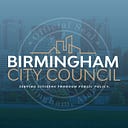Councilor Clinton Woods submits resolution opposing lottery bill without education funding
Alabama is one of only eight states currently without a lottery. There is a bill, SB 220, that has passed through the Alabama Senate and is waiting for a vote in the House of Representatives that would allow for a state lottery.
The Senate approved the bill 21–12.
However, Birmingham City Councilor Clinton Woods, and many others, see a major flaw in the legislation: there is no money earmarked for education unlike most other lotteries in the United States.
Woods has submitted a resolution that will appear on next Tuesday’s agenda opposing the legislation as it is currently written. While Woods supports a state lottery, he said not earmarking money for education is “unacceptable.”
Here is a copy of SB 220:
“Alabama has lagged behind when it comes to an education lottery. Looking at Georgia specifically, they have an education lottery that not only generates a great deal of revenue, but it also allows students in the state who maintain a 3.0 GPA to attend any state school with free tuition,” Woods said. “Imagine if we had that kind of springboard in Alabama to help students further their education?”
Alabama is currently ranked 47th in the nation for education. The estimated annual revenue generated from the paper ticket lottery will be roughly $167 million.
Instead of being utilized specifically for funding education, the proceeds from the lottery, after administrative costs and payouts, would be deposited into the Alabama Trust Fund and the state’s General Fund.
“Alabama has one of the best Pre-K programs in the country, but less than five percent of kids have access to it because it’s underfunded,” Woods said. “We’re missing a major opportunity with this current bill to address the issues with education in our state. Imagine the difference that money could make in Birmingham. We could give every child access to a Pre-K program and make sure they enter school being able to read. That would be huge.”
Woods said that while he does view lotteries as a bit of a regressive tax, having that revenue go toward funding education the “benefit to the community outweighs the negative impact.”
Here is a copy of the resolution will appear on the May 7, 2019 agenda:
